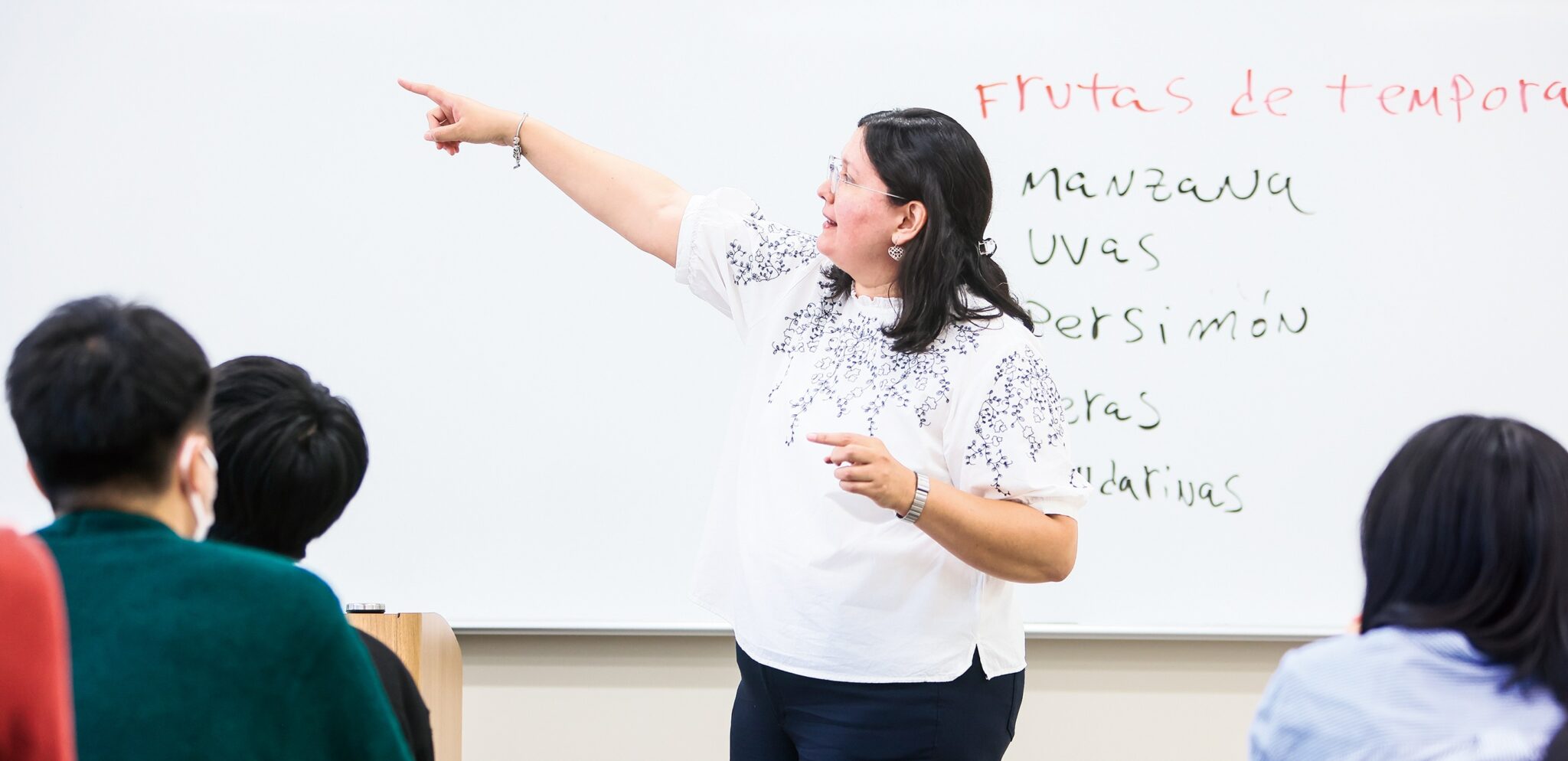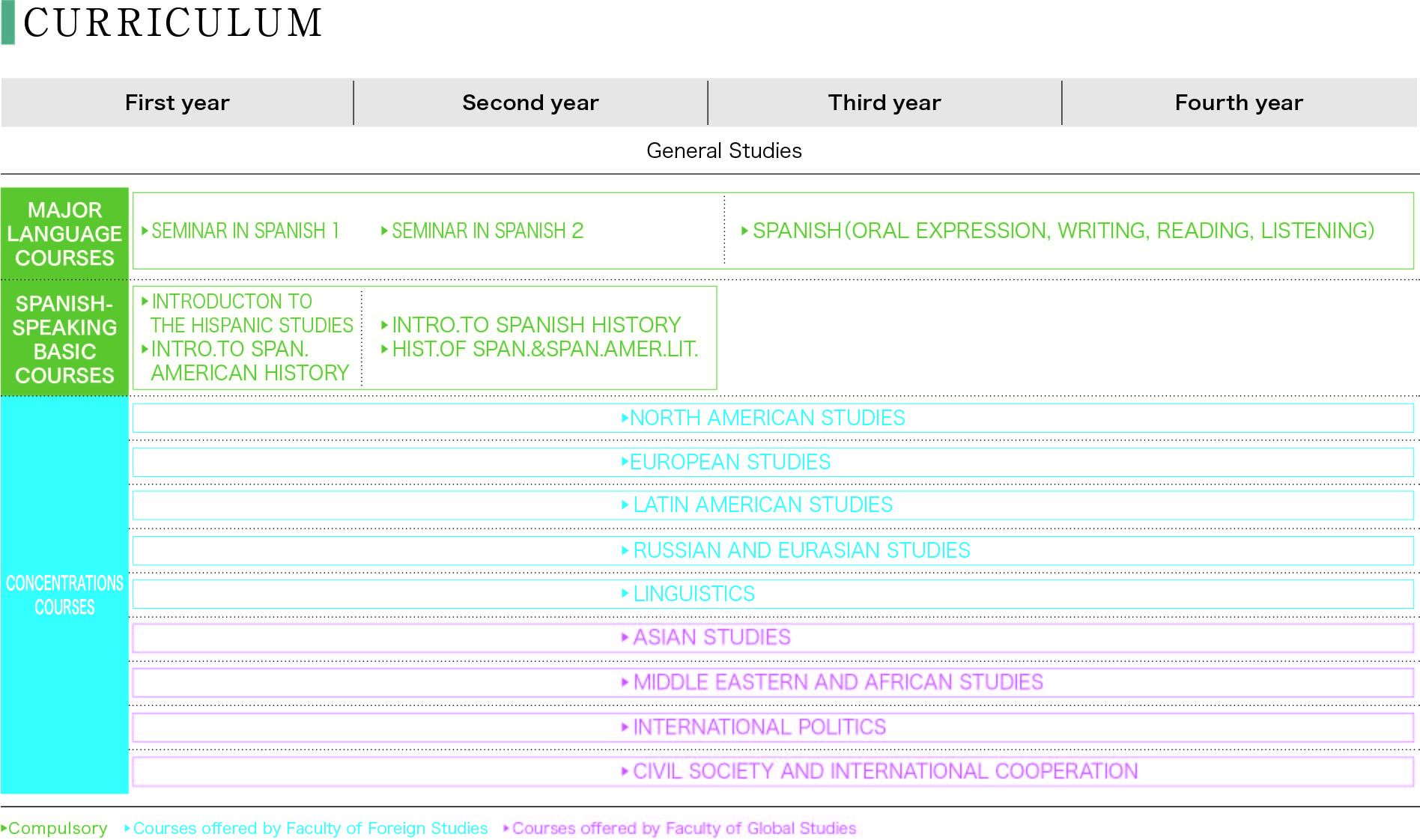Department of Hispanic Studies


Department Features
Countries that use Spanish as the official language are in Europe (Spain), the Americas (Mexico and 16 other countries), the Caribbean (Cuba, Dominican Republic, and the U.S. territory of Puerto Rico), and Africa (Equatorial Guinea). It is also one of the official languages of the United Nations. Also, in the United States, the Hispanic population is growing rapidly, and the presence of Hispanic people and speakers of the language is increasing.
The Department of Hispanic Studies fosters individuals with expertise in the Spanish language and the Spanish-speaking world, as well as a high level of intercultural communication skills, and who can perceive the world from multiple and relative perspectives.
Curriculum
In the Language Courses of the First Major, students build up the four skills (reading, listening, writing, and speaking) of the Spanish language in stages. Senior students can also choose from courses offered in reading comprehension, oral expression, writing, and other skills that each student wishes to improve. In addition, in Basics in Spanish-Speaking Countries, students will acquire basic knowledge of the Spanish-speaking world, such as the history of Spain, which is essential for learning about the Spanish-speaking world. In the Second Major, each student selects a research course of interest and completes a set of courses to systematically study and research a certain region or academic field. In their final year of study, students compile the results of their investigations into a graduation thesis.
as of 2022
* Please refer to the syllabus for more information on the courses.
Course Examples
- Seminar in Spanish I & II
A required course for first- and second-year students. Students will acquire basic grammar and vocabulary of the Spanish language and learn the basics of the four skills (reading, listening, writing, and speaking) as well as how to learn the Spanish language.
- History of Spain& Spanish-American Literature
A required course for second-year students. The course provides an overview of the history of Hispanic literature, and students learn about the rich world of Hispanic literature by viewing fragments of works and considering the culture and society that formed the background of the works. The course is taught in Spanish by native speakers of the language.
- Spanish A
Students learn more advanced grammatical structures and improve their writing skills by using newspaper articles and other materials to address cultural and current issues. Afterward, students actually write a composition and have it evaluated by native-speaker teachers.
- Introduction to the Hispanic Studies
This course functions as the foundation of the Basics in Spanish-Speaking Countries courses. This course provides students with the knowledge, research methods, and thesis/report writing skills necessary for conducting research activities, and serves as a foundation for subsequent course planning and research.
- Introduction to Spanish History
This course provides an overview of the history of Spain from ancient times to the present, which is important for understanding the Spanish-speaking world. Not only does it provide a deeper understanding of modern Spain, but it also serves as a prerequisite for students who plan to study abroad in the Spanish-speaking world.
- Introduction to Spanish American History
Students will learn the basics of Spanish American history, which is important for conducting research on Spanish-speaking and Latin American countries.
Available Teaching Licenses and Subjects
- First Category Teaching license for Junior High School (Hispanic)
- First Category Teaching license for High School (Hispanic)
Curatorial courses are available.
Educational Objectives and Policies
-
To cultivate advanced proficiency in Hispanic languages and impart a broad base of knowledge (of humanities, social sciences, and the basic features of the Hispanic world) that will provide the foundations for specialized research in fields such as area studies and linguistics.
-
To produce individuals capable of contributing to increasingly globalized societies through advanced proficiency in Hispanic languages, and experts in research related to area studies and linguistics.
-
The Department of Hispanic Studies sets standards for the skills and knowledge students should acquire before graduations as described below. Those who fulfill the graduation requirements shall be deemed to have acquired these qualities and will be awarded a diploma.
The Department aims to have all students reach a level of proficiency equivalent to “B2” (level sufficient to study at an overseas university) under the Common European Framework of Reference for Languages (CEFR) at the timing of graduation and furthermore to have as many students as possible reach a level equivalent to “C1” (level sufficient to study at an overseas university)
- Abilities related to receptive activities, including “listening” and “reading” Spanish.
- Abilities related to productive activities, including “speaking” and “writing” in Spanish.
- Abilities related to interactive activities, including communicating and negotiating in Spanish.
- Activities related to mediating activities, including interpreting and translating Spanish.
- The ability to understand the history, politics, economy, society and culture of Spanish-speaking areas in the context of their global status and comparisons with Japan.
-
In accordance with the Diploma Policy, the Department of Hispanic Studies constructs its curriculum with courses aligned with the following purposes:
- 【Major Language – Compulsory Courses (Basic Spanish I, II)】Students learn the four basic Spanish skills of “listening, speaking, reading and writing” in their freshman and sophomore years. Through lectures and seminars on grammar, reading and creative writing focused on “reading” and “writing” skills, and classes centered on oral practice, students will build a foundation for Spanish
proficiency. Collaboration among Japanese and native speaker faculty members enable students to efficiently learn a new language. Students are expected to participate in class with a positive attitude and to engage in proactive learning in and outside class. - 【Major Language – Compulsory Courses (Integrated Spanish)】Juniors and seniors will build on
their Spanish proficiency by selecting the field that they wish to particularly enhance: “speaking and listening,” “reading,” “reading and speaking,” “writing” and “reading and writing.” Students will use the fundamental academic skills acquired in their freshmen and sophomore years to acquire more practical and applicable proficiency. Classes will take various forms, such as lecture based reading comprehension using practical teaching material, dictation aimed at higher listening comprehension skills using audiovisual rooms, group communication and presentations, and debates. Native speaker faculty use mainly Spanish in class and thus students learn academic contents in Spanish. Japanese faculty members are more focused on approaching advanced grammar and enhancing vocabulary by reading more sophisticated literature. - 【Major Language – Basic Area Studies Courses】These courses aim to have freshmen and sophomores acquire fundamental knowledge of the history, politics, economics, society, culture and language of Spanish-speaking countries and regions (Spanish-speaking world). Classes are mainly lecture-based but also engage students in group work and presentations. Spanish-speaking Area Studies, offered under this course group, will enable students to acquire fundamental literacy, such as literature search and report compilation skills.
- 【Major Language – Compulsory Courses (Basic Spanish I, II)】Students learn the four basic Spanish skills of “listening, speaking, reading and writing” in their freshman and sophomore years. Through lectures and seminars on grammar, reading and creative writing focused on “reading” and “writing” skills, and classes centered on oral practice, students will build a foundation for Spanish
-
- Seeks students interested in various issues associated with the language, history, politics, economy, society and culture of Spanish-speaking countries and regions, and motivated to acquire a high level of Spanish proficiency;
- Generally seeks students who wish to study Spanish for the first time at the Department of Hispanic Studies, but also welcomes students with some experience in learning Spanish who are prepared to be committed to enhancing their Spanish proficiency through renewed systematic learning; and
- Expects students to pursue specialized studies in the discipline or geographical area chosen from the nine Concentrations offered at the Faculty of Foreign Studies, supported by their practical proficiency in Spanish or other foreign languages.
Faculty Members
Nina HASEGAWA Professor
Noriko MATSUBARA Professor
Nancy Eunice ALAS MORENO Assistant Professor
